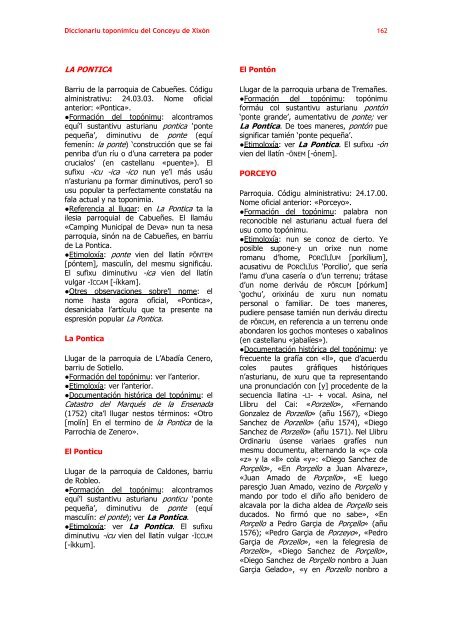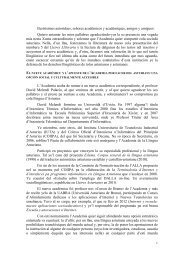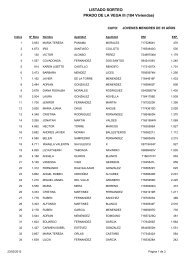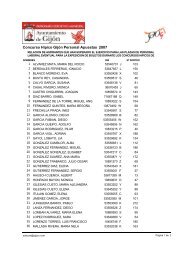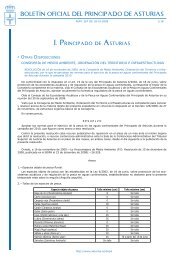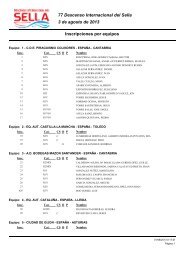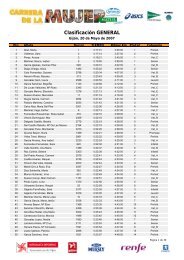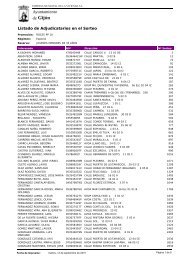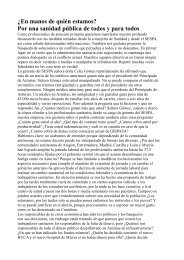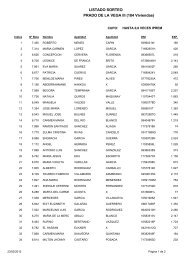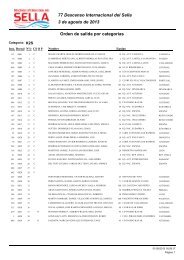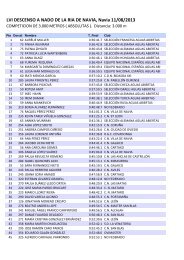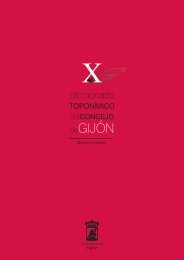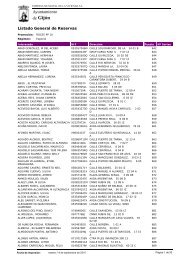Diccionariu toponímicu del conceyu de Xixón _bicolor_ - El Comercio
Diccionariu toponímicu del conceyu de Xixón _bicolor_ - El Comercio
Diccionariu toponímicu del conceyu de Xixón _bicolor_ - El Comercio
You also want an ePaper? Increase the reach of your titles
YUMPU automatically turns print PDFs into web optimized ePapers that Google loves.
<strong>Diccionariu</strong> <strong>toponímicu</strong> <strong><strong>de</strong>l</strong> Conceyu <strong>de</strong> <strong>Xixón</strong><br />
LA PONTICA<br />
Barriu <strong>de</strong> la parroquia <strong>de</strong> Cabueñes. Códigu<br />
alministrativu: 24.03.03. Nome oficial<br />
anterior: «Pontica».<br />
●Formación <strong><strong>de</strong>l</strong> topónimu: alcontramos<br />
equí’l sustantivu asturianu pontica ‘ponte<br />
pequeña’, diminutivu <strong>de</strong> ponte (equí<br />
femenín: la ponte) ‘construcción que se fai<br />
penriba d’un ríu o d’una carretera pa po<strong>de</strong>r<br />
crucialos’ (en castellanu «puente»). <strong>El</strong><br />
sufixu -icu -ica -ico nun ye’l más usáu<br />
n’asturianu pa formar diminutivos, pero’l so<br />
usu popular ta perfectamente constatáu na<br />
fala actual y na toponimia.<br />
●Referencia al llugar: en La Pontica ta la<br />
ilesia parroquial <strong>de</strong> Cabueñes. <strong>El</strong> llamáu<br />
«Camping Municipal <strong>de</strong> Deva» nun ta nesa<br />
parroquia, sinón na <strong>de</strong> Cabueñes, en barriu<br />
<strong>de</strong> La Pontica.<br />
●Etimoloxía: ponte vien <strong><strong>de</strong>l</strong> llatín PŎNTEM<br />
[póntem], masculín, <strong><strong>de</strong>l</strong> mesmu significáu.<br />
<strong>El</strong> sufixu diminutivu -ica vien <strong><strong>de</strong>l</strong> llatín<br />
vulgar -ĪCCAM [-íkkam].<br />
●Otres observaciones sobre’l nome: el<br />
nome hasta agora oficial, «Pontica»,<br />
<strong>de</strong>saniciaba l’artículu que ta presente na<br />
espresión popular La Pontica.<br />
La Pontica<br />
Llugar <strong>de</strong> la parroquia <strong>de</strong> L’Abadía Cenero,<br />
barriu <strong>de</strong> Sotiello.<br />
●Formación <strong><strong>de</strong>l</strong> topónimu: ver l’anterior.<br />
●Etimoloxía: ver l’anterior.<br />
●Documentación histórica <strong><strong>de</strong>l</strong> topónimu: el<br />
Catastro <strong><strong>de</strong>l</strong> Marqués <strong>de</strong> la Ensenada<br />
(1752) cita’l llugar nestos términos: «Otro<br />
[molín] En el termino <strong>de</strong> la Pontica <strong>de</strong> la<br />
Parrochia <strong>de</strong> Zenero».<br />
<strong>El</strong> Ponticu<br />
Llugar <strong>de</strong> la parroquia <strong>de</strong> Caldones, barriu<br />
<strong>de</strong> Robleo.<br />
●Formación <strong><strong>de</strong>l</strong> topónimu: alcontramos<br />
equí’l sustantivu asturianu ponticu ‘ponte<br />
pequeña’, diminutivu <strong>de</strong> ponte (equí<br />
masculín: el ponte); ver La Pontica.<br />
●Etimoloxía: ver La Pontica. <strong>El</strong> sufixu<br />
diminutivu -icu vien <strong><strong>de</strong>l</strong> llatín vulgar -ĪCCUM<br />
[-íkkum].<br />
<strong>El</strong> Pontón<br />
162<br />
Llugar <strong>de</strong> la parroquia urbana <strong>de</strong> Tremañes.<br />
●Formación <strong><strong>de</strong>l</strong> topónimu: topónimu<br />
formáu col sustantivu asturianu pontón<br />
‘ponte gran<strong>de</strong>’, aumentativu <strong>de</strong> ponte; ver<br />
La Pontica. De toes maneres, pontón pue<br />
significar tamién ‘ponte pequeña’.<br />
●Etimoloxía: ver La Pontica. <strong>El</strong> sufixu -ón<br />
vien <strong><strong>de</strong>l</strong> llatín -ŌNEM [-ónem].<br />
PORCEYO<br />
Parroquia. Códigu alministrativu: 24.17.00.<br />
Nome oficial anterior: «Porceyo».<br />
●Formación <strong><strong>de</strong>l</strong> topónimu: palabra non<br />
reconocible nel asturianu actual fuera <strong><strong>de</strong>l</strong><br />
usu como topónimu.<br />
●Etimoloxía: nun se conoz <strong>de</strong> cierto. Ye<br />
posible supone-y un orixe nun nome<br />
romanu d’home, PORCĬLĬUM [porkílium],<br />
acusativu <strong>de</strong> PORCĬLĬUS ‘Porcilio’, que sería<br />
l’amu d’una casería o d’un terrenu; trátase<br />
d’un nome <strong>de</strong>riváu <strong>de</strong> PŎRCUM [pórkum]<br />
‘gochu’, orixináu <strong>de</strong> xuru nun nomatu<br />
personal o familiar. De toes maneres,<br />
pudiere pensase tamién nun <strong>de</strong>riváu directu<br />
<strong>de</strong> PŎRCUM, en referencia a un terrenu on<strong>de</strong><br />
abondaren los gochos monteses o xabalinos<br />
(en castellanu «jabalíes»).<br />
●Documentación histórica <strong><strong>de</strong>l</strong> topónimu: ye<br />
frecuente la grafía con «ll», que d’acuerdu<br />
coles pautes gráfiques históriques<br />
n’asturianu, <strong>de</strong> xuru que ta representando<br />
una pronunciación con [y] proce<strong>de</strong>nte <strong>de</strong> la<br />
secuencia llatina -LI- + vocal. Asina, nel<br />
Llibru <strong><strong>de</strong>l</strong> Cai: «Porzello», «Fernando<br />
Gonzalez <strong>de</strong> Porzello» (añu 1567), «Diego<br />
Sanchez <strong>de</strong> Porzello» (añu 1574), «Diego<br />
Sanchez <strong>de</strong> Porzello» (añu 1571). Nel Llibru<br />
Ordinariu úsense variaes grafíes nun<br />
mesmu documentu, alternando la «ç» cola<br />
«z» y la «ll» cola «y»: «Diego Sanchez <strong>de</strong><br />
Porçello», «En Porçello a Juan Alvarez»,<br />
«Juan Amado <strong>de</strong> Porçello», «E luego<br />
paresçio Juan Amado, vezino <strong>de</strong> Porçello y<br />
mando por todo el diño año beni<strong>de</strong>ro <strong>de</strong><br />
alcavala por la dicha al<strong>de</strong>a <strong>de</strong> Porçello seis<br />
ducados. No firmó que no sabe», «En<br />
Porçello a Pedro Garçia <strong>de</strong> Porçello» (añu<br />
1576); «Pedro Garçia <strong>de</strong> Porzeyo», «Pedro<br />
Garçia <strong>de</strong> Porzello», «en la felegresia <strong>de</strong><br />
Porzello», «Diego Sanchez <strong>de</strong> Porçello»,<br />
«Diego Sanchez <strong>de</strong> Porçello nonbro a Juan<br />
Garçia Gelado», «y en Porzello nonbro a


